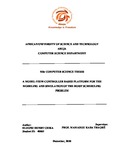| dc.description.abstract | Federal government independent revenue, non-oil revenue and oil revenue are some of the different sources of money for the Nigerian government. The sources of tax revenue include Pay as You Earn (PAYE), Stamp Duty (STD), Companies Income Tax (CIT), Value Added Tax (VAT), Personal Income Tax, and Petroleum Profit Tax (PPT). Due to the fact that taxes are now one of Nigeria's main sources of income, it is crucial to understand what to expect in terms of their amount. This will either help identify how to improve the country's budget or how to align it with the country's economic situation, depending on the current economic climate. This study makes use of monthly data collected over a period of time based on Federal inland revenue service (FIRS) source data related to earlier collections from a variety of tax categories between the years 2010 and 2021. To determine the optimal model, this study analyzed the projected values and model accuracy from three models multivariate Linear Regression (MLR), seasonal autoregressive integrated moving average (SARIMA) and multi-variate long short-term memory networks (LSTM). Because we could predict using
multiple independent variables, both LSTM and MLR fared better. The LSTM model had a R2 score of 98.9% and an adjusted R2
score of 98.8%. Our findings indicate that multi-variate long short-term memory networks can be used to forecast tax revenue with reasonable accuracy and the multivariate Linear Regression comes close when multiple independent variables are used. This can further be enhanced by using other macro-economic factors for greater accuracy | en_US |

